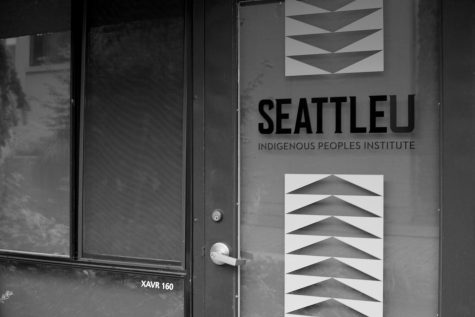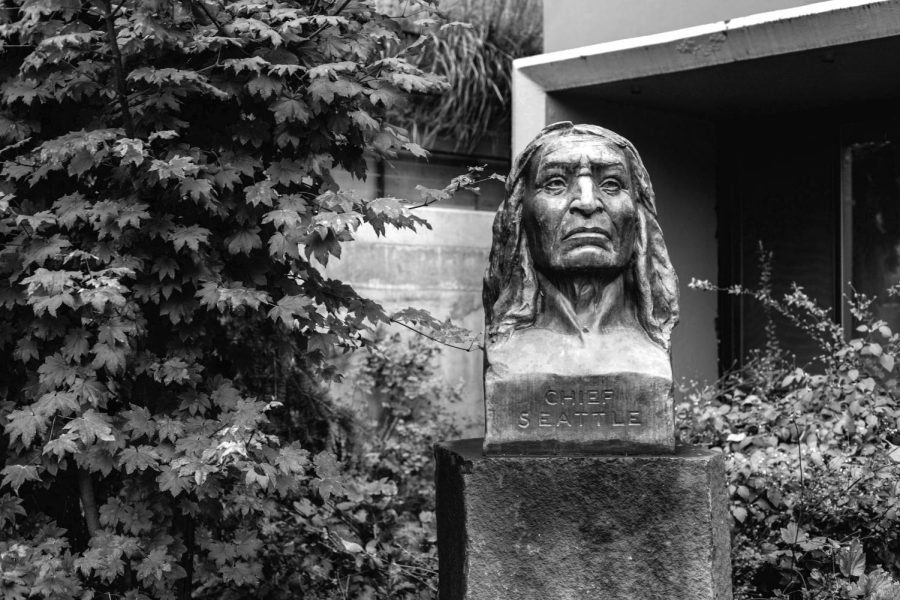IPI Provides Resources During Native American and Alaskan Native Heritage Month
Chief Seattle outside the Indigenous Peoples Institute
The history of Native American and Alaskan Native communities in the U.S. is one of profound accomplishment and wisdom which has been marked by violence, prejudice and oppression. Beginning in the 17th century, European colonizers stripped Indigenous peoples of their land, forcing them to assimilate to Western culture, the impacts of which are still felt to this day. Indigenous peoples were relocated off of their traditional homeland to reservations, which are still disproportionately affected by poverty.
In 2020, one in every three Native Americans was living in poverty. Native American women are at a high risk of experiencing violence, with more than half having experienced some form of sexual violence. Today, only 19% of Native Americans between the ages of 18-24 are enrolled in college, less than half that of the national average. Despite these injustices, Native American culture continues to thrive. The month of November is set aside in honor of the contributions Native Americans and Alaskan Natives have made in the past and continue to make on our Nation.
The City of Seattle was built on the land of the Coast Salish people, including the Duwamish. It was named after Chief Seattle, a leader of the Suquamish and Duwamish tribes. At Seattle University, Indigenous students, staff and faculty continue to carry on the legacy of their ancestors. In 1990, President George Bush designated November as National American Indian Heritage Month. In 2008, the name changed to Native American and Alaskan Native Heritage Month in order to recognize the contributions of Alaskan Natives, but the sentiment is the same; it is a time for Americans to acknowledge and engage with Indigenous culture.
Throughout the holidays and celebrations of November, many Americans are setting aside time to reflect on what they are grateful for during the Thanksgiving holiday. However, November carries another layer of significance: to honor and remember Indigenous culture. Christina Roberts, Associate Professor in the English Department and Director of the Indigenous People’s Institute (IPI), is an Aaniiih and Nakoda woman who has worked at Seattle U for almost 16 years.
While Native American and Alaskan Native Heritage Month presents an opportunity to begin a dialogue and ask questions, engaging with and acknowledging Native American culture is a process that requires more than a month of education. Roberts recommends “An Indigenous Peoples’ History of the United States” by Roxanne Dunbar-Ortiz, “Native Seattle: Histories from the Crossing-Over Place” by Coll Thrush and “Tulalip, From My Heart” by Harriette Shelton Dover. Roberts appreciates this month as an opportunity for people who are not Indigenous to wrestle with uncomfortable questions and educate themselves.
“To be Indigenous is a year-round experience, but I try to think of it as an opportunity to build relationships and make connections between people who are not Native,” Roberts said.
At Seattle U, the IPI provides resources for Indigenous students on campus. Tony Monroe works as the Program Assistant for the IPI and is a citizen of the Confederated Tribes and Bands of the Yakama Nation. Monroe and his colleagues provide a space in Xavier Hall for Native students to gather and spend time.
“It’s a space not just for Native students, but for anyone who wants to be involved in or learn about Native culture,” Monroe said.
Six years ago, the IPI spawned from the Indigenous Student Association (ISA), a student group whose mission was to foster greater awareness of the Indigenous presence at Seattle U. The ISA is still on campus, providing a support network for Native students. Since its conception, the IPI has supported Indigenous students financially. The IPI provides over $40,000 in scholarships for Native students and can also provide financial assistance to aid students’ personal needs. Students can learn more about available resources by meeting with the IPI.
The IPI provides a community for the 123 who identify as Native or multiracial Native at Seattle. One of these students is First-year Accounting major Miguel Rosario, who has tribal affiliations with the Confederated Tribes of the Colville Reservation as well as the Native Alaskan Haida and Aleut tribes. During his senior year of high school, Rosario was the president of his school’s Native American Club.
“We are an underrepresented community, and it’s nice to have some sense of community,” Rosario said.
Roberts thinks of the IPI as a space where Indigenous experiences are highlighted and amplified. The IPI’s resources extend past financial. Their mission is to support Indigenous students’ success in every aspect of their lives. They offer one-on-one mentorship with Seattle U alumni, faculty and staff as well as providing programming that addresses strategies for college success.
“There’s beautiful work that’s taking place within tribal communities,” Roberts said. “We…amplify and spotlight that to raise awareness on the part of non-Native folks about the incredible works that are taking place.”
One issue that is currently being championed by Indigenous advocates is related to upholding the Indian Child Welfare Act (ICWA). The Seattle U School of Law co-hosted a Webinar on the ICWA with the University of Nevada, Las Vegas Law School, Nov. 7. The ICWA was enacted in 1978 to address the increasing number of Indigenous children who were being taken from their families and placed with non-Native families. Brooke Pinkham, staff director of the Center for Indian Law Policy at the Seattle U School of Law, is a Nez Perce citizen who was raised in the community of the Yakama Nation. As an Indigenous woman, Pinkham has been deeply affected by the results of sending children to boarding schools and removing them from their families.
“The result has been horrible,” Pinkham said. “We see adults who have come from that dealing with a lot of mental health issues.”
The ICWA was intended to keep children with their families, but the Supreme Court is now reconsidering the constitutionality of the act. The Supreme Court will hear the case of Brackeen vs. Haaland, Nov. 9. Their ruling will determine the future of the ICWA, which would have broad ramifications for Native American and Alaska Native rights.
“It’s brought us to the U.S. Supreme Court, which is really scary because if that is undone, there could be potential for tribal sovereignty to be undone,” Pinkham said.
Pinkham advocates for education about Indigenous history in early elementary school. She argues that tuition ought to be waived for Indigenous students to remove a significant barrier to reaching higher education. She also believes in the power of allyship and student voices.
Olympic gold medalist Billy Mills spoke at the Student Center on campus Nov. 8 and held a town hall Q&A Nov. 9. Mills is Oglala Lakota (Sioux) and grew up on the Pine Ridge Indian Reservation. Despite living in poverty and becoming an orphan at 12, Mills earned a track scholarship from the University of Kansas, and in 1964, Mills won an Olympic gold medal in the 10,000 meters race. He is still the only American to win gold in the event.
Through the rest of November, the IPI will be hosting food events on Thursdays to highlight traditional Indigenous foods including either bison or elk stew, a traditional dessert and frybread. There are also a number of events happening throughout the city including Native art exhibits at the Burke Museum, the Seattle Art Museum and the Stonington Gallery. While attending these events can be helpful for students to engage with Native cultures, Pinkham encourages students to educate themselves more than anything.
“Self-education is easy to say, but really, it has to be intentional and purposeful,” Pinkham said. “If you want to know more about Indigenous communities, there has to be some real intention behind it.”
During this month, Roberts asks students not only to educate themselves and learn about Indigenous history and culture but also to appreciate the culture that is present in their community today.
“It’s an opportunity for people in this country to spend perhaps a little bit more time acknowledging the history of Indigenous Peoples thinking about our shared history and all that has occurred, but in large part, It’s also an opportunity to celebrate the vibrancy and the resilience,” Roberts said.
Father Patrick Twohy is a Jesuit priest who has lived with and served the Indigenous peoples of the Pacific Northwest for more than 40 years. He continues to work pastorally with Native communities.
“They have a depth of love, concern and kindness. The greatest human value is to be related in a good way, and [Indigenous peoples] have taught me that,” Twohy said.
Twohy grew up in an era when there was widespread prejudice against tribes throughout the U.S.. However, over his lifetime, he has seen Indigenous communities flourish. As someone who has experienced Native culture as an outsider, Twohy was struck by the values commonly shared within Indigenous communities.

“They want to take care of their neighbors. Their neighbors didn’t treat them well, but there’s no payback,” Twohy said. “Whatever they do, they do it for all of us. They’re saving streams, and they’re saving salmon. They’re doing everything they can, and that’s for all.”
Throughout November there are a number of days that are important to Indigenous communities. Native Americans serve in the U.S. military at a higher rate than any other demographic, making Veteran’s Day, Nov. 11, an important moment for the community. It is often marked with a Powwow, which are spiritual ceremonies that are open to the public. Nov. 25 recognizes Native American Heritage Day, which falls on the Friday after Thanksgiving. It is a day to appreciate the contributions Indigenous people have and continue to make to the nation.
“It’s important to remember who we are and where we came from,” Monroe said. “There are 39 tribes in Washington State. We’re still here.”
In the Seattle area, the United Indians of All Tribes Foundation provides educational, cultural and social services to Indigenous people in the Puget Sound region. Currently, the Foundation is seeking donations to build a Canoe Center on the shore of South Lake Union. The center will be available for everyone to engage with the traditional canoe culture of the Pacific Northwest tribes. The United Indians of All Tribes Foundation is also responsible for the Daybreak Star Indian Cultural Center, located in Discovery Park. Daybreak Star is open to the public and is a resource for anyone who is interested in learning more about how to support Indigenous communities.
Despite Native American and Alaskan Heritage Month being celebrated in November, Indigenous experiences and contributions are felt year-round and should be recognized as such. The month provides an opportunity for questions to be asked and conversations to be had, but lifting up Indigenous communities is an effort that doesn’t end when the calendar flips over to December.





Kelly Sullivan
Nov 16, 2022 at 6:51 pm
Fantastic article and important history we all can grow from and need to!